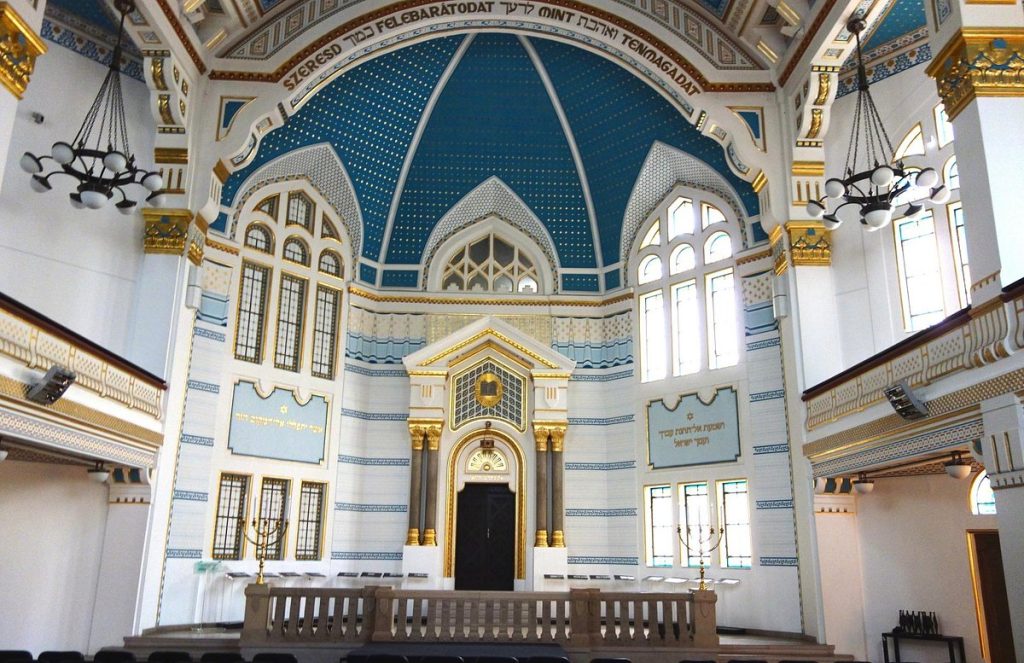Holocaust Memorial Center: Honoring the Past, Illuminating the Future
The Holocaust Memorial Center, a national institution founded by the Government in 1999, stands as a testament to remembrance and education. Its location on Páva Street, beyond the traditional Jewish quarter, underscores its national significance. In a world where few state-established institutions focus solely on Holocaust research and education, the center shines as a beacon of commitment.
A Place of Reflection and Learning
Architectural Harmony
Step into a unique space acclaimed by Frank Owen Gehry, one of our era’s preeminent architects, as one of Budapest’s most impressive settings. This modern building seamlessly intertwines with the historic Páva Street Synagogue, a once-thriving hub of Jewish worship. Here, history’s resonance becomes tangible, and the echoes of the past find new life. The architectural design serves as a powerful metaphor for continuity and remembrance, blending the old and the new to create a space that honors the past while looking toward the future.
The Páva Street Synagogue
The synagogue, a center focal point, has been meticulously preserved and integrated into the museum’s design. It is a poignant reminder of the vibrant Jewish community that once thrived in Budapest. Visitors can explore this historic synagogue, gaining insights into the religious and cultural life of Hungarian Jews before the Holocaust.
Exhibitions and Programs
Interactive Exhibitions
The Holocaust Memorial Center isn’t just a museum; it’s a living entity dedicated to research, education, and culture. Within its walls, interactive exhibitions provide a comprehensive overview of the Holocaust in Hungary. These exhibitions combine multimedia displays, personal testimonies, and historical artifacts to create an immersive and educational experience.
Pedagogical Programs
The center offers a wide range of pedagogical programs for students and educators. These programs are designed to foster a deeper understanding of the Holocaust and its lasting impact on humanity. Workshops, seminars, and educational tours provide valuable learning opportunities and encourage critical thinking and empathy.
Cultural Performances
Cultural performances, including concerts, readings, and theater productions, are regularly hosted at the center. These events explore themes related to the Holocaust, Jewish culture, and human rights, offering visitors a chance to engage with history through various forms of artistic expression.
Enriching Visitor Experience
Guided Tours and Thematic Explorations
Guided tours are available in five languages, ensuring that a diverse audience can fully appreciate the center’s offerings. Thematic explorations delve into specific aspects of the Holocaust and Jewish life in Hungary, providing a more focused and detailed understanding of the topics covered.
Bookshop and Coffee Shop
The on-site bookshop offers a selection of literature on the Holocaust, Jewish history, and human rights. It’s a valuable resource for visitors looking to deepen their knowledge. Adjacent to the bookshop is a cozy coffee shop, where visitors can relax and reflect on their experience. The serene environment encourages contemplation and discussion, making it an integral part of the visit.
Honoring the Past and Illuminating the Future
A Beacon of Commitment
The Holocaust Memorial Center serves as a beacon of commitment to remembering the atrocities of the Holocaust and ensuring that such events are never forgotten. Through its comprehensive educational programs and engaging exhibitions, the center plays a crucial role in Holocaust education and awareness.
Path to Understanding and Compassion
Visiting the center is an act of honoring the past and bearing witness to history. It is a place where the stories of the victims and survivors are told with dignity and respect. The center’s mission extends beyond remembrance; it aims to illuminate a path toward a more understanding and compassionate world. By educating future generations, the Holocaust Memorial Center strives to prevent the repetition of such horrors and promote a culture of tolerance and human rights.
Practical Information for Visitors
Location and Accessibility
The Holocaust Memorial Center is located at Páva Street, in a district that reflects Budapest’s commitment to preserving its history. The center is easily accessible by public transport, making it convenient for both locals and tourists.
Hours and Admission
Before visiting, check the center’s official website for current opening hours and any special events or closures. Admission fees are modest, and discounts are often available for students, seniors, and groups.
Visitor Etiquette
Visitors are encouraged to approach the center with respect and mindfulness. Photography policies vary, so it’s best to ask staff about any restrictions.
Conclusion
The Holocaust Memorial Center stands as a beacon of remembrance and education. It is more than a museum; it is a place of reflection, learning, and cultural engagement. By visiting, you honor the past, bear witness to history, and contribute to a future rooted in understanding and compassion. The center’s commitment to Holocaust education and its comprehensive programs ensure that the lessons of the past illuminate the path to a more humane and just world.


